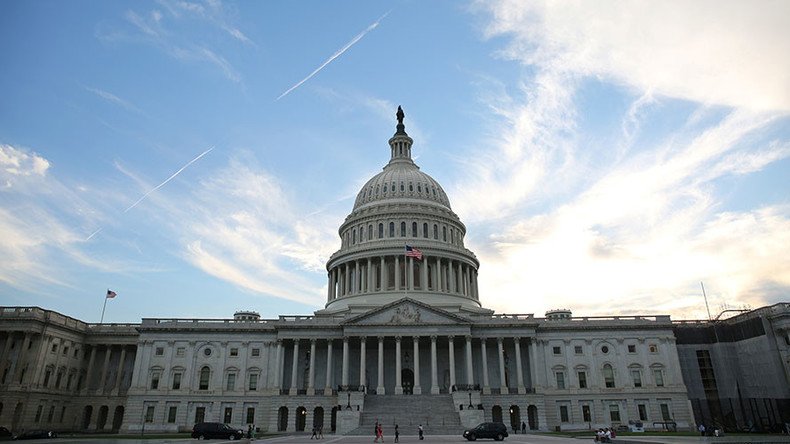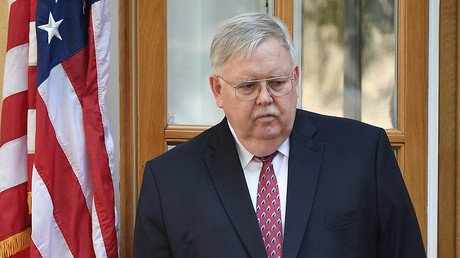'US Russia sanctions: Tug of war between American government branches'

With a new Russia sanctions bill, the US Congress is imposing its own foreign policy without regard to the impact on Europe or considering President Trump's objectives, analysts say. But will he sign or veto the legislation?
The US Senate on Thursday approved a new round of sanctions against Russia. An overwhelming majority voted in favor of the bill which also targets Iran and North Korea. The legislation now only needs President Donald Trump's signature to come into force.
During the hearing, senators emphasized that Russia is being targeted for its alleged meddling in last year's US election. Russian President Vladimir Putin lambasted the proposed sanctions, saying sanctions against Russia can be perceived as "aggravation" and "exceptional cynicism."
In response, Moscow told the US to reduce the number of diplomatic staff in Russia to 455 people and halt the use of embassy storage facilities.
RT discussed with analysts how the situation could develop further and whether Trump could veto the bill.
US Senate approves new sanctions bill against Russia, Iran & N. Korea https://t.co/rAl1cm7Qvc
— RT (@RT_com) July 28, 2017
Trump's new communications director, Anthony Scaramucci, told CNN on Thursday that the sanctions could be amended, and made even tougher.
“He may sign the sanctions exactly the way they are, or he may veto the sanctions and negotiate an even tougher deal against the Russians,”he said.
According to political commentator John Bosnitch, “Scaramucci’s comments look very much to me like bait and switch.”
“It appears to me to be an attempt to draw the Congress into a delaying action on implementation of the sanctions,” he told RT. “I do not think that Trump has any scruples about vetoing if he needs to. We have to remember that FDR, Franklin D. Roosevelt, exercised more than 350 vetoes during his presidency. So this should be nothing new to the Democrats.”
In his opinion, President Trump doesn’t care much “about what an opposing Senate and opposing Congress think about him.”
“His votes came from the American people. He is the head of the executive branch of the US government. The executive branch leads in foreign policy under the supervision of Congress. What’s happening here is – Congress is attempting to take over presidential powers,” Bosnitch said. “As the president, the president must veto this if he wants to retain his full powers,” he added.
Defense analyst Ivan Eland, argues that it would be “politically smart” for Trump to sign the sanctions bill.
“It passed by the overwhelming majorities of both Democrats and Republicans… Both parties can agree to sanction Russia over the elections. It is a big deal here – this is a big deal that goes to the heart of our system – this is not Ukraine, this is not Syria – this is a US election, and in the US many people here feel that we were attacked,” he explained.
In Eland’s opinion, the US president would like to lift sanctions on Russia imposed near the end of the Obama administration
“I think Trump would like to lift sanctions on Russia, and the Congress doesn’t want him to do it, and the Congress wants to put even more sanctions on,” he said.
“This is a lot bigger than just US-Russian relations. You are now seeing the tug of war between the branches of the US government. In our government the Congress is very powerful, and the Supreme Court is very powerful, and the states are very powerful, and they all are pushing back against Trump. This is one area where they are pushing back, so Congress is reasserting itself as it did during Watergate,” Eland told RT.
"We will not tolerate attacks on our democracy. That's what this bill is about" - Sen. #McCain (R-Arizona) https://t.co/a5Z6bJSlBQpic.twitter.com/lTkEV7eJSd
— RT America (@RT_America) July 27, 2017
Earl Rasmussen, Executive Director at the Eurasia Center, says he was surprised by the scale of the support the bill received, also adding that the decision is likely to alienate America’s European partners.
“Obviously there are elements within that that are anti the president and that have always been anti-Russia. But I am surprised by the mass, the vast number of it – especially when the purpose of this has been stated to include Russia. There was this alleged hacking, which there is no evidence –I will tell you there probably will never be any evidence – and ‘Russian aggression.' To be honest, I haven’t seen any of that either. I have seen a lot of US aggression, unfortunately,” he told RT.
What we’re having here, in Rasmussen’s view, is “we’re creating a worse situation and are alienating our European partners, as well.”
“We’ve got Congress imposing essentially their own foreign policy without regard to the impact on Europe, nor consideration of the ultimate objectives of President Trump,” he said.
Germany has warned the US of possible countermeasures. David Swanson, author of "War Is A Lie" says it’s “good to see someone stand up and push back,” but that’s not enough.
“The way I’d like to do it – would be following in the words of the President Vladimir Putin, that is - upholding the rule of law. I think the US should be taken to the World Court and the International Criminal Court for a whole range of abuses of the law across western Asia in the recent years. These sanctions are depicted as law enforcement – they are law violation,” Swanson said.
The new bill would prevent President Trump from lifting Obama-era sanctions. In Swanson’s opinion though, “his powers are supposed to be limited under the US Constitution.”
“He is not supposed to be an emperor; he is not supposed to be what the presidency has evolved into the past several decades. He’s supposed to enforce the laws created by Congress. It ought not to be an outrage for Congress to insist that its measures be enforced as passed by Congress – that ought to be the norm. This is radically contrary to what Trump wants to do, and what the secretary of state wants to do and the oil company that he still serves wants to do. Either Trump is going to simply violate the sanctions, or he is going to be stuck abiding by them because he’s going to have to sign the bill,” he concluded.
The statements, views and opinions expressed in this column are solely those of the author and do not necessarily represent those of RT.













